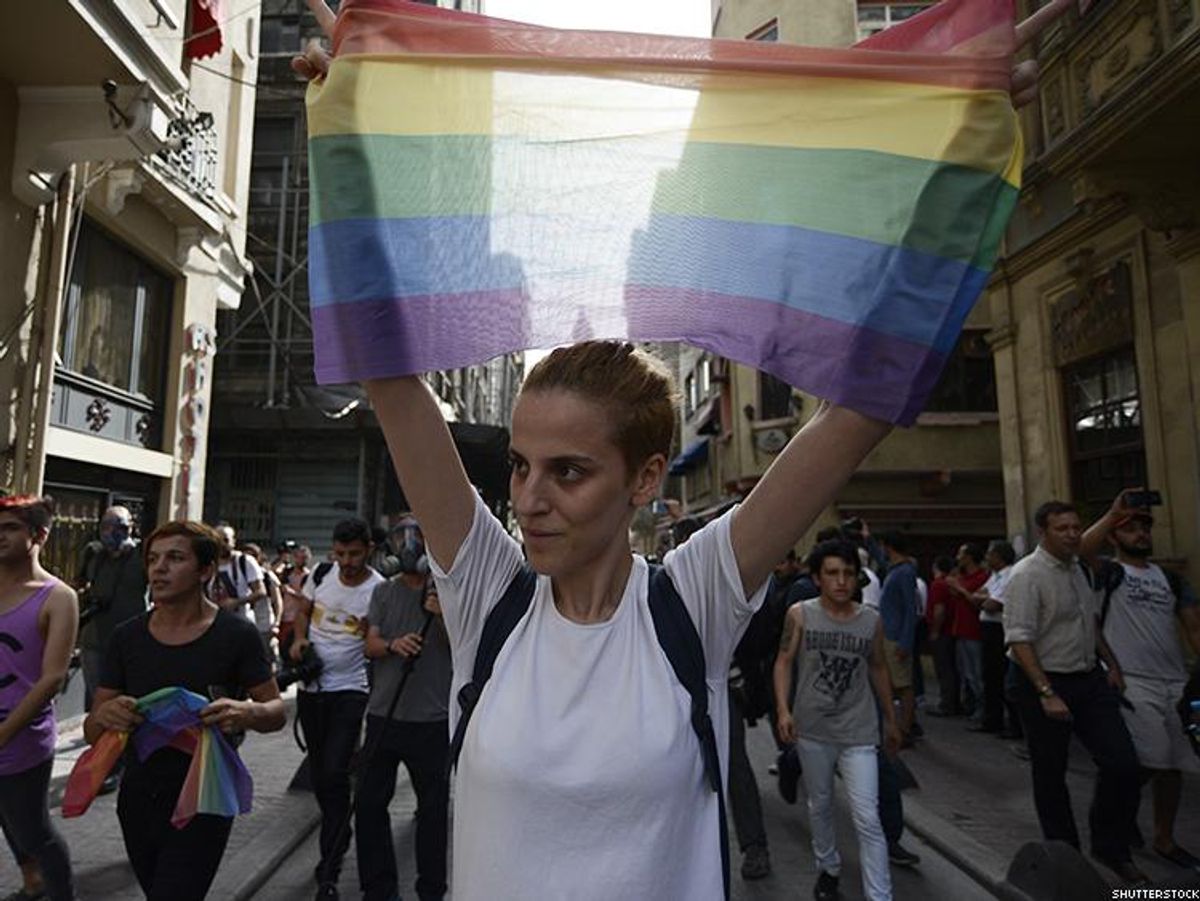On June 28, 1970, the Christopher Street Liberation Day march took place, commemorating the uprising at the Stonewall Inn one year earlier. Los Angeles held an event that day as well in what
The Advocate described joyfully as "not just a protest march, but a full blown parade." Fred Sargeant, a marcher in New York that day, wrote in
The VIllage Voice that it took "a new sense of audacity and courage to take that giant step into the streets." Out of audacity, courage and the strength to celebrate pride was born.
Today our rights are threatened again, and many in the LGBT community are afraid of what is happening to our country. We need a Pride that marches for our community's struggles; it's time to march, protest, and resist! Pride committees nationwide should learn from that day in 1970 and see what is happening now -- a grassroots uprising is springing up and a national Pride march is taking shape. Every Pride committee can harness that power, if they are willing to change.
Pride celebrations in most major cities have gotten stale, using the same tired model that focuses on a parade that is filled with big corporate sponsors hawking their wares. The only audacity in modern pride now is its naked devotion to the almighty dollar. No better example of this is Washington, D.C.'s Pride celebration and parade, Capital Pride, which has become so bloated in corporate sponsors that it's not even called a Ppride parade anymore -- it's the Pride Parade Presented by Marriott International. Capital Pride's parade is just one example of how Pride across the country has lost the battle cry for liberation and instead pushes a new slogan; buy our stuff.
Is it any surprise that Capital Pride was caught flat-footed with the announcement that on Sunday, June 11, Washington, D.C., would be host to the national march for LGBT equality? The announcement at first confused many; it's one day after Capital Pride's parade. Did national LGBT leaders and Pride organizers not realize how close the two events would be? No, LGBT leaders had nothing to do with planning the national march. The march was the creation of one ordinary person, David Bruinooge. He is not an LGBT rights leader or professional activist, just a gay man in New York who told the
Washington Blade that after watching the Women's March in January that he thought LGBT people "should be doing something like this to follow up on the momentum."
What started out as an idea in Bruinooge's head in late January and a
Facebook event for an LGBT rights march has taken on a life of its own. The event now has over 110,000 people expressing interest in the march and has received attention from almost every major LGBT news outlet. Capital Pride was taken by surprise when the march quickly gained national attention, forcing Pride leaders to scramble to ensure the march and Pride work in tandem. Ryan Bos, Capital Pride's executive director, was smart to quickly intervene, endorsing the march and offering support, though not any money. Yet even with Bos's keen play, it is clear that by the end of January this June's Pride weekend had already gotten away from Pride organizers.
The attention this march has generated shows that it's time for Pride committees to admit Pride celebrations need to change. Pride has become too corporate, and Pride parades have become an endless commercial. In these times we need Pride to courageously stand up to corporate interests and get back to being a march for our rights.
Los Angeles Pride understands this and has already abandoned a parade, replacing it with a march.
When Pride committees allow corporations to feature so prominently, Pride comes off as supporting corporate interests over the needs of our community. This is at the heart of why the national Pride march is getting so much attention; it's not speaking to the affluent or to big corporations, it's speaking to everyday working-class queers -- an audacious act in today's LGBT community -- and that focus makes it authentic, feeding interest in the march.
Pride committees and many other LGBT organizations have pushed the idea we are all well off, with money to spend on the products of all these corporate sponsors, but the reality is the LGBT community is much more economically diverse. The idea that
the LGBT community is affluent is a myth: We face higher rates of poverty, we have a harder time finding work, and when we find work we are at risk of being fired for being who we are. Does anyone think the Pride events of today, filled with luxury brands truly speak to the one out of every five LGBT people
living below the federal poverty line or, for that matter, to the rest of us who are not wealthy?
Pride needs to speak for us, and we need Pride to reflect who we really are -- diverse, not all affluent, and proud to come in every color of the rainbow. I hope Pride leaders see what is happening and change. It is time for Pride to get back to its roots as a march dedicated to remembering those who have fought for our rights, and to push on. Pride committees across the country can use this national march and the first Pride as guides for reshaping Pride and win back the movement, for if not, they will be at risk of being left behind.
ALEX MORASH is a vice president of the Gertrude Stein Democrats, is a writer on economic issues based in Washington, D.C., and can be reached on Twitter @AlexMorash. The views expressed here are his own. 
















































































